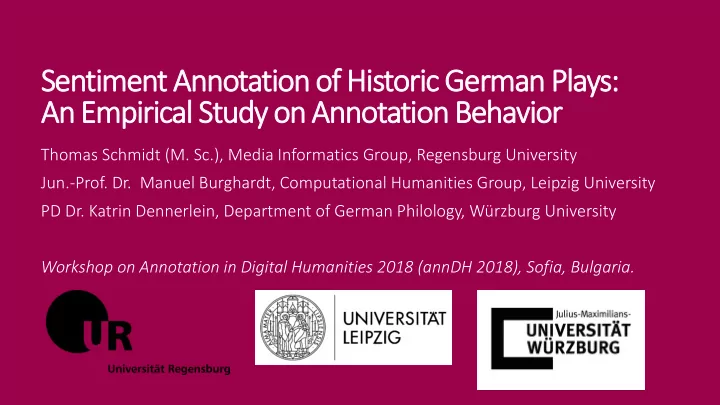

Sentiment Annotation of Historic German Plays: An Empirical Study on Annotation Behavior Thomas Schmidt (M. Sc.), Media Informatics Group, Regensburg University Jun.-Prof. Dr. Manuel Burghardt, Computational Humanities Group, Leipzig University PD Dr. Katrin Dennerlein, Department of German Philology, Würzburg University Workshop on Annotation in Digital Humanities 2018 (annDH 2018), Sofia, Bulgaria.
Structure • What is Sentiment Analysis? • Sentiment Analysis in Literary Studies • Project context • Annotation Studies • Recent studies and future plans 2
Sentiment Analysis – Definition „ Se Sentim iment Analy lysis is , also called opinion mining, is the field of study that analyzes people‘s opin inio ions, se sentim iments, apprais isals ls, , attit itudes, and em emotio ions toward entities and their attributes expressed in writ itten text xt .“ (Liu, 2016, p. 1) People’s opinions? Towards entities? 3
What is sentiment analysis? 4
Project Context Dr Drama Lessing Act Sc Scene Schmidt, Burghardt & Dennerlein (2018) Schmidt & Burghardt (2018a) Schmidt & Burghardt (2018b) 5
Motivation for sentiment annotation Evaluation Machine Learning Gathering insights about the requirements/theory/guidelines of sentiment annotation in literary texts 6
Annotation Study • 5 annotators • All non-experts (!) • 200 representative speeches of the Lessing Corpus 7
Annotation Scheme 8
Annotation Study Duration Annotation Process Questionnaire Interview 9
Annotation Distribution (Polarity) Titel Genre Damon oder die wahre Freundschaft Comedy Der Freigeist Comedy Der junge Gelehrte Comedy Der Misogyn Comedy Der Schatz Comedy Die alte Jungfer Comedy Die Juden Comedy Emilia Galotti Tragedy Minna von Barnhelm Comedy Miss Sara Sampson Tragedy Nathan der Weise Dramatic Poem Philotas Tragedy 10
Binary polarity 11
Emotion Distribution 12
Levels of agreement α < 0 = poor Percentage of of Annotation Krippendorff‘s α ag agreement 0 < α < 0.2 = slight 0.2 < α < 0.4 = fair Polarity 0.22 40% 0.4 < α < 0.6 = moderate differentiated 0.6 < α < 0.8 = substantial Binary polarity 0.47 77% 0.8 < α < 1 = ( almost) perfect 13
Problems • The annotation is perceived as very difficult and tedious (Overall difficulty: Med =6) • The certainty of the annotation is average ( Med =3) • Takes around 5 hours to complete • Poetic and archaic language • Content-related overall context • Irony and sarcasm • Polarity shifts 14
Problems The instruction and the annotation schema are problematic People’s opinions? Towards entities? 15
Expert annotation Overall ll rese search question: What le level l of of expertis ise is is necessary ry? Super-Expert for Lessing 16
Comparison: polarity annotation Non-Experts Expert 17
Averaged Averaged κ Annotation Percentage of of Expert valu alues agreement ag compared to non- Differentiated 0.19 39% experts Polarity Binary polarity 0.45 76% Percentage of of Annotation Krippendorff‘s α ag agreement Non-Experts Differentiated compared to 0.22 40% each other Polarity Binary polarity 0.47 77% 18
Results Some problems are resolved (Language, context) Many problems persist Overall: Polarity distribution is similar No differences concerning agreement statistics Tendency to over-thinking Takes similar amount of time but is not perceived so tedious and difficult! What level of expertise is needed? 19
https://tinyurl.com/y8hubfag 20
Recent studies and future plans Students of the master program in German literary studies at the University of Würzburg Experts on one play About 1800 Annotations One play annotated from start to finish Feedback (Questionnaires, Focus Group, Course) 21
Annotation instruction/guidelines Very precise and multiple times pretested annotation instruction/guidelines Goal: no misunderstandings 22
Other annotation plans Gather more data Deriving precise models and research questions Exploring possibilities of crowdsourcing / Combination with expert annotation Exploring and developing tools for sentiment annotation Broaden the scope 23
Thank you for your attention! Questions, Feedback, Criticism? Contact: thomas.schmidt@ur.de burghardt@informatik.uni-leipzig.de katrin.dennerlein@uni-wuerzburg.de Twitter: @thomasS_UniR @8urghardt 24
References Liu, B. (2016). Sentiment Analysis. Mining Opinions, Sentiments and Emotions. New York: Cambridge University Press. Schmidt , T., Burghardt, M. & Dennerlein, K. (2018). „Kann man denn auch nicht lachend sehr ernsthaft sein?“ – Zum Einsatz von Sentiment Analyse-Verfahren für die quantitative Untersuchung von Lessings Dramen. In Book of Abstracts, DHd 2018 . Schmidt, T. & Burghardt, M. (2018a). Toward a Tool for Sentiment Analysis for German Historic Plays. In: Piotrowski, M. (ed.), COMHUM 2018: Book of Abstracts for the Workshop on Computational Methods in the Humanities 2018 (pp. 46-48). Lausanne, Switzerland: Laboratoire laussannois d'informatique et statistique textuelle. Schmidt, T. & Burghardt, M. (2018b). An Evaluation of Lexicon-based Sentiment Analysis Techniques for the Plays of Gotthold Ephraim Lessing. In: SIGHUM Workshop on Language Technology for Cultural Heritage, Social Sciences, and Humanities (LaTeCH-CLfL 2018). 25
Recommend
More recommend